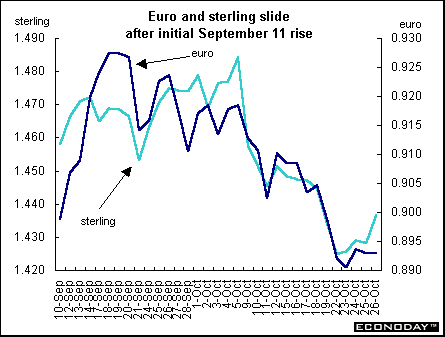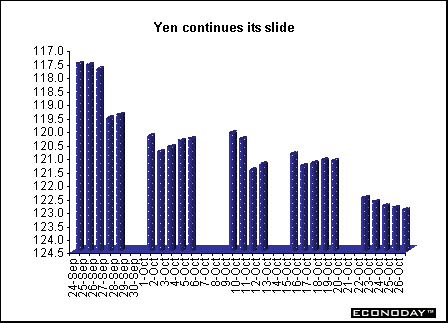
Currencies
The euro continued its dismal drift downward against the U.S. dollar. It pulled the British pound sterling down with it until Friday, when British preliminary third quarter GDP defied gravity and rose 0.6 percent on the quarter (2.2 percent when compared with the third quarter of 2000). The euro continues to slump, as monetary stimulus has been limited by the ECB's foot dragging and fiscal stimulus contained by the stringent stabilization pact which limits deficit spending.

The dollar rallied against the yen for a fifth week and against the euro for a third, as investors continue to anticipate a speedier recovery in the U.S. than either Japan or Europe. The U.S. currency has regained all the ground it lost in the week after the September 11 terrorist assault. The dollar advanced even as anthrax-laced letters raised concern that terrorists will make increased use of biological weapons. The dollar has risen 4.3 percent against the euro and 6 percent against the yen from lows reached after last month's attack.
The Japanese government is putting together another spending package, this time aimed at stemming record unemployment. The job creation program is the centerpiece of a 1 trillion yen spending package. Another 200 billion yen will go to unspecified job-related measures, including unemployment benefits, under a plan approved over the weekend by economic ministers. The spending package is aimed at funding dozens of measures that Prime Minister Junichiro Koizumi's key economic panel has proposed. The panel is discussing steps to cut state spending, reduce national debt and force banks to dispose of their loans. Japan's public debt is projected to reach 666 trillion yen in March 2002, equaling 130 percent of the country's gross domestic product. The government also plans to help create a fund charged with buying stocks of companies that are financially viable and implementing appropriate restructuring programs. Japanese lenders are buried under 151 trillion yen ($1.2 trillion) of bad and risky loans, according to some government estimates, however analysts say the figure is closer to 240 trillion yen.

 |


Introduction • Global Stock Market Indexes • Recap of Global Markets • Currencies • Indicator Scoreboard

The Bottom Line • Looking Ahead
|